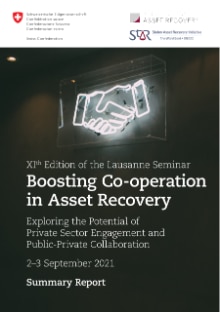- Home
- FDFA
- Publications
- All publications
Search and filter
Publications: 529
-

Boosting Co-operation in Asset Recovery: exploring the Potential of Private Sector Engagement and Public-Private Collaboration
During the two-day virtual seminar, held on 2-3 September 2021, international experts looked at emerging practices to strengthen information sharing between the public and private sectors when identifying, freezing and confiscating stolen assets. Against the background of ever-new methods of money laundering, the participants drew on first-hand experience and analyzed how criminal law enforcement agencies, financial intelligence units (FIUs) and financial institutions can use complementary expertise, information and capacity to enhance economic crime detection and facilitate asset tracing. The result is a compilation of insights on how asset recovery challenges can be addressed and resolved by leveraging advances and opportunities for greater financial information sharing partnerships (FISP) collaboration.
-

Swiss cooperation programme South Caucasus Region 2022-2025
-

Swiss Cooperation Programme Bangladesh 2022-25
The Swiss Cooperation Programme for Bangladesh 2022–25 builds upon lessons learnt from 50 years of partnership focused on empowering the most vulnerable segments of the population and promoting gender equality. Switzerland will continue supporting Bangladesh on its journey to graduate from the least developed country category and to progress towards achieving the sustainable development goals, whilst leaving no one behind.
-

Swiss cooperation programme for Central Asia 2022-2025
Peace, social cohesion and prosperity in Central Asia constitute an essential aim of Swiss foreign policy. Switzerland’s engagement in the region began in the 1990s after four Central Asian States joined the Swiss-led voting groups at the World Bank Group, the IMF, and the EBRD, and it has expanded ever since.
-

Swiss Cooperation Programme Serbia 2022-2025
-

Swiss Cooperation Programme Sudan 2022-2025
Swiss Cooperation Programme Sudan 2022-25
-

Swiss Peace Supporter 4/2021
The last issue of the Swiss Peace Supporter in 2021 focuses on the Western Balkans, where the largest Swiss military contingents are deployed. Switzerland's civilian peace support comprises inclusive dialogue platforms (p. 10) and support for the Kosovo Specialist Chambers (p. 18). Don't miss our articles on the UN's fight against human trafficking and on disaster-induced migration in East Africa.
-

Un seul monde 4/2021
Research plays a central role in reducing poverty and environmental damage. Especially in the area of food security, researchers contribute to great successes - and yet face huge challenges.
-

Flyer - Peace and Human Rights Division
Flyer with a short presentation of the activities of the Peace and Human Rights Division (FDFA, State Secretariat)
-

Global Programme Migration and Forced Displacement
The GPMFD Programme Framework 2022–25 (Global Programme Migration and Forced Displacement) illustrates the division's commitment to address the root causes of forced displacement and irregular migration. Conflict prevention and climate change mitigation will be as important as the protection of displacement-affected communities in their region of origin and the creation of sustainable prospects for people in the Global South.
-

Swiss Peace Supporter 3/2021
By combining conflict management and the promotion of democracy, Switzerland believes it can be an agent for change. For example, it aims to reinforce democratic processes by promoting free and fair elections and supporting freedom of expression in the digital space. The reports from eastern Ukraine, Kashmir and the UN headquarters in New York (on children and armed conflict) are also well worth a read.
-

Swiss Cooperation Programme North Macedonia 2021-24
Last update 26.01.2022
